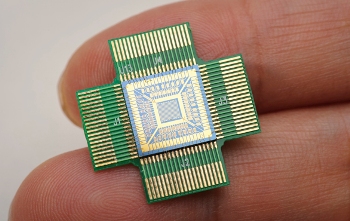NASA's Ames Research Center, Moffett Field, Calif., has won the 2012 NASA Government Invention of the Year for a tiny sensor that can detect chemicals in the air.
 A multiple-channel silicon-based sensing chip, which consists of 64 nanosensors and is less than one square centimeter. (Image credit: NASA Ames/Dominic Hart)
A multiple-channel silicon-based sensing chip, which consists of 64 nanosensors and is less than one square centimeter. (Image credit: NASA Ames/Dominic Hart)
“High Sensitive, Low Power and Compact Nano Sensors for Trace Chemical Detection” was invented by Jing Li and Meyya Meyyappan of NASA Ames, and Yijang Lu of the University of California, Santa Cruz.
The invention includes methods and systems for estimating one or more unknown parts of a gas using carbon nanotubes. The electronic sensors developed from these carbon nanotubes are inexpensive, light-weight and consume very little power. A typical sensor device based on this concept includes a set of comb-shaped metal microelectrodes fabricated by photolithography on an electrically insulating substrate.
The sensors have been deployed by NASA to detect trace gases in the crew cabin on the International Space Station. Other federal agencies are using sensors based on this technology to detect trace gases in various environments. Specific applications for which the innovative sensors have been tested and used include trace chemical detection in planetary exploration, air monitoring, leak detection and hazardous agent detection using cell phones. Potential future applications may include environmental monitoring, industrial process monitoring and control and biomedical diagnosis.
“We’re very pleased to have Ames inventiveness recognized with this award for the third consecutive year,” said S. Pete Worden, NASA Ames center director. “With this invention, our people have basically created the insides of a tricorder, and based on the uses we’ve already demonstrated, I can’t wait to see the fantastic applications that NASA and industry are going to devise for it.”
Each NASA field center submits nominations for the awards, which are evaluated by NASA's Inventions and Contributions Board. The board determines which nominations qualify for each category, ranks the nominees, and makes recommendations to the NASA Office of the General Counsel for review and approval.
This year Ames also won a Commercial Invention of the Year runner- up recognition for its Rehydration Beverage, a patented water-electrolyte beverage that results in significantly greater body hydration levels than similar beverages available on the market. Invented by Ames’ John Greenleaf, it has been used by astronauts before, during and after spaceflight, including missions to the International Space Station, and by athletes who require rapid rehydration after strenuous exercise.
Ames previously earned the NASA Government Invention of the Year award in the following years:
- 2007, for low-density, lightweight heat shield materials
- 2008, for a high-speed 3-D laser scanner with real time processing
- 2010, for software that creates simulations for managing air traffic scenarios
- 2011, for a low-cost, lightweight, two-piece, thermal protection system for use on space vehicles during atmospheric re-entry at hypersonic speed
Ames also won NASA Commercial Invention of the Year in 2010 for the Powder Handling Device for Analytical Instruments.